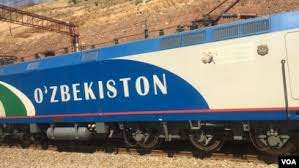 Pakistan, Uzbekistan, and Afghanistan have signed an agreement to build a 760-kilometer-long (472-mile-long) railway track connecting the three nations. The railroad would travel from Termez, Uzbekistan to Kharlachi, Pakistan via Mazar-i-Sharif, Afghanistan. The project is scheduled to be completed by the end of 2027 at a cost of $2.8 billion. The success of the rail link will depend on a number of factors, including the political stability of the region, the availability of financing, and the continued, unconditional, and willing cooperation of the three countries. Nonetheless, the potential advantages of the rail link are substantial, and the initiative has the potential to transform the region.
Pakistan, Uzbekistan, and Afghanistan have signed an agreement to build a 760-kilometer-long (472-mile-long) railway track connecting the three nations. The railroad would travel from Termez, Uzbekistan to Kharlachi, Pakistan via Mazar-i-Sharif, Afghanistan. The project is scheduled to be completed by the end of 2027 at a cost of $2.8 billion. The success of the rail link will depend on a number of factors, including the political stability of the region, the availability of financing, and the continued, unconditional, and willing cooperation of the three countries. Nonetheless, the potential advantages of the rail link are substantial, and the initiative has the potential to transform the region.
The concept of a rail connection between Pakistan, Uzbekistan, and Afghanistan dates back many years. In the 1970s, the Soviet Union proposed constructing a railroad connecting the three nations. Due to the 1989 Soviet withdrawal from Afghanistan, however, the project was never completed. The ratification of the agreement on July 18 in Islamabad, in the presence of “high-ranking” railway officials from the three countries, brought the age-old concept to fruition. According to plan, the rail route will traverse Termiz, Uzbekistan, Afghanistan’s Mazar-e-Sharif and Logar provinces, and conclude in Pakistan via the Kharlachi border crossing in the Kurram tribal district near the Afghan border.
Reportedly, the financing for this 760 km railway track has not yet been finalized, however, the World Bank, the Asian Development Bank, and the European Bank for Reconstruction and Development have all expressed interest in lending support to the project, but no formal commitments have been made. Russia has also said that it would be willing to assist in laying down the railway and supplying locomotives and rolling stock, provided the project is able to attract fundings. In the absence of any firm commitments from international financial institutions, it is possible that the signatory countries will have to fund it themselves which seems uphill task keeping in view the dilapidated financial outlook of both Pakistan and Afghanistan, but if financial arrangements are made, it would be a major boost to regional trade and economic development.
The project is expected to be completed by the end of 2027, and by 2030, trains will be able to transport up to 15 million tonnes of products annually. The line will facilitate both passenger and freight services, reduce cargo delivery periods between Uzbekistan and Pakistan by approximately five days and transport costs by at least 40 percent. With the signing of the protocol, it would begin the phases of meticulous planning, resource allocation, and project implementation, as well as a concerted, coordinated efforts to establish robust regional connectivity.
The project’s strength rests in its capacity to stimulate regional trade and economic growth, generate employment, and provide cost-effective industrial raw materials and utilities to enhance the competitiveness of industrial services and agricultural outputs. The project is expensive and may be difficult to finance, is likely to encounter security challenges, particularly while passing through Afghanistan, and may require years to complete. It will create numerous opportunities, including the possibility of linking with the Gwadar port, which would provide Central Asian countries with access to a warm-water port, and extending to other nations in the region. It may also face hazards such as political instability in one or more of the involved countries and imminent economic challenges, such as a decline in global trade and a dearth of export substitutes.
This project would provide Pakistan with an efficient and time-saving way to export its agricultural products, such as wheat, sugar, rice, maize, and vegetables and fruits such as apples, oranges, tomatoes, and potatoes, dairy products, such as milk, yogurt, and cheese, meat and poultry, such as beef, chicken, and lamb, and a variety of processed food products, including canned food, spices, frozen food, and snacks. Pakistan can export cotton, wool, and silk in the textile industry, as well as a variety of home appliances, including refrigerators, televisions, washing machines, and electronics besides sports goods and surgical instruments.
Uzbekistan is a major producer of cotton, which is used to create textiles such as clothing, home furnishings, and other products. In addition to cotton, Uzbekistan also produces grapes, melons, and tomatoes. In addition, it is a significant producer of meat and dairy products, including beef, lamb, and milk. It grows wheat and other cereal grains. It also produces gold, silver, and copper, among other minerals. It has a developing manufacturing sector and produces a range of appliances, including refrigerators, televisions, and washing machines, as well as mobile phones, computers, and televisions, as well as a range of construction materials, including cement, steel, and lumber.
Afghanistan’s mineral wealth allows it to export copper, iron, gold, and lithium for use as basic materials in the production of finished goods. In addition to being a significant producer of agricultural products such as fruits and vegetables, it can also export carpets and other similar items. Afghanistan has oil and gas reserves that could be used to produce gasoline, diesel, and aviation fuel for export to Pakistan and Uzbekistan, where they could be used to fuel automobiles, generators, and other machinery.
The rail link could also be connected to the strategically located Gwadar port in Pakistan for the benefit of the entire region and the globe by giving Central Asian countries access to a warm-water port and giving Pakistan a new route into Central Asia and beyond. Once fully operational, it would help reduce poverty by creating a significant number of employment opportunities in the construction, operation, and maintenance of the rail link, and its increased trade and transportation efficiency would make it more attractive to investors.
The signing of the contract occurs at an important time. The somewhat shaky peace in Afghanistan may have been a major factor in the other two countries’ decision to move forward with the project, despite the fact that other nations of the world may view it with skepticism due to the unrecognized status of the interim Afghan government and its deliberate refusal to adhere to the Doha Agreement. Nonetheless, the region is presently experiencing a period of relative peace and stability, which has made the signing of this and other high-value projects such as CASA 1000 and TAPI gas pipeline possible. The success of these essential initiatives will establish a regional ecosystem to promote economic industrial, trade and investments.
The success of the project will also depend on the strong political will of the states and should not be affected by the change of governments in the respective countries, the allocation of sufficient and timely resources to it, and the hiring of credible, experienced, and resourceful contractors who have the ability, expertise, and resources to adhere to the project’s timelines in letter and spirit.
Importantly, the success of the project would largely depend on the security and safety of the entire region, the eradication of terrorism from all countries, the destruction of terrorist safe havens, especially in Afghanistan, and the creation of a law and order situation that ensures the safe, secure, and effortless movement of goods along the route and to its destinations.
The security situation in Afghanistan will be the most difficult barrier for this project. Contrary to the Doha Agreement, Afghanistan is providing safe havens to over 6000 fully armed and trained Tehreek-i-Taliban Pakistan (TTP) terrorists who are carrying out terrorist attacks all along the border, putting the lives and properties of people living in border areas in great danger and in constant state of fear. They have also martyred scores of civilians and security personnel in recent days, prompting the Army Chief to warn Afghanistan to eliminate these terrorist groups which have ransomed the security and stability of the entire region. These terrorist groups pose a significant risk to all such projects traveling through Afghanistan, necessitating the Afghan government’s efforts to rid the country of the dangers of terrorism and extremism.
The donor agencies’ commitment of huge funds will also be contingent on the security and safety and establishment of law and order in Afghanistan, in the absence of which the donor agencies will naturally shy away from making any commitment for provision of funds, and one does not need rocket science to understand that cash starved Afghanistan and Pakistan are unable to fund this initiative with their own funds. With Afghanistan’s security issues resolved, the project makes a lot of economic sense.
The author is the former Press Secretary of the President of Pakistan, the former Press Minister of the Embassy of Pakistan in France and also has been the former MD / CEO Shalimar Recording and Broadcasting Company (SRBC)


